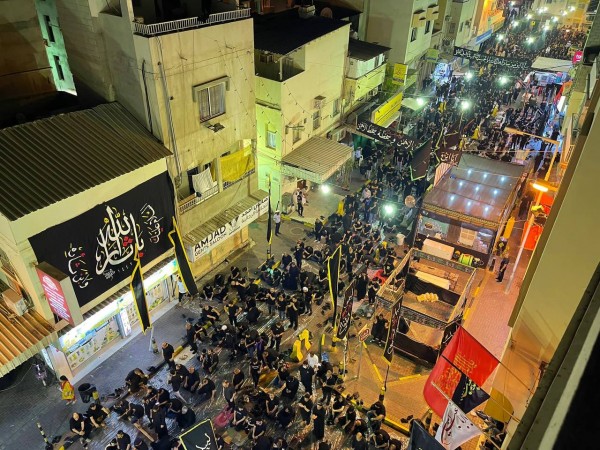Stopping "Shiite Expansion" in Muharraq to "Judaization of Manama": This is How Government Worked for Years to Besiege Shiites and Obliterate their Identity

2022-08-30 - 2:33 p
Bahrain Mirror (Exclusive): In late 2006, Muharraq Governor Salman bin Hindi made a statement that stirred public opinion, when he made the governorate's approval a condition to sell any of Muharraq's real estates. This was considered as an official ban on real estate trading in the area.
After entering the Parliament, Al-Wefaq raised a parliamentary question to the Minister of Justice and Islamic Affairs, and the official in charge of the Survey and Land Registration Bureau, but the minister denied that there was a ban on real estate sales in Muharraq, "and if there was a decision, it would be made to preserve the heritage sites."
Two years following Bin Hindi's statement, we heard from the Muharraq Municipal Council Chairman Mohammed Jassim Hamada different words, when he explained that there is "a plan the Ministry of Works is working on to develop the old areas of Muharraq, hence we said that the sales will be stopped, and if the sales are between the people of Muharraq, we have no objection." He continues "We have stopped some sales in some areas that are under development. There are houses located on future roads; we stopped selling to prevent the complication of the project or increase of house prices, and there is only a rationalization of sales."
The Survey and Land Registration Bureau has been complicit for years with all the decisions that clamp down on the identity of the majority of Bahraini citizens, which is the Shiite identity. It is no secret to say that the decisions prevent the Shiites from having ownership in east and west Riffa, as these decisions have been perpetually in force. However, the Survey Bureau received new instructions that began to affect many areas in Bahrain.
The purpose of all these decisions, as they say, is to "preserve the demographic nature" of the areas, which in fact means ending the Shiite presence or preventing the Shiite expansion in areas intended to remain fully Sunni, as the real estate registration bureau currently prevents Shiites from owning properties in "the cities of Muharraq, Busaiteen, Galali, Al-Houra, Al-Qudaibiya, Budai and the Southern Governorate in general."
Currently, when making any purchase transaction, you are required to obtain the approval of the real estate registration, while this authority issues the written authorization to you, but in the event of rejection it is enough to inform the buyer by phone without providing him with any written documents.
"There are instructions not to sell to Shiites in these areas, even if the owner of the property is Shiite, but things remain at the discretion of the employee and the official, sometimes the names of some Shiites do not indicate their sectarian affiliation, which means the issuance of approval because the employee thinks the purchaser is Sunni. However, Sunnis can buy and own property in most areas of Bahrain with minor exceptions related to West Riffa and related to the family to which the Sunni who wants to own property in that sensitive area belongs," explains one of the employees of the agency.
The employee goes on to say: "The new area of Galali turned at the beginning of the millennium into a rather mixed area, due to the ownership that the Shiite Ajam from Muharraq had in it. This stopped more than 10 years ago, and now the newly naturalized Pakistani who does not master Arabic can own in Galali, while the Ajam Shiite who was born and has lived in Muharraq cannot."
These examples show us the ruling family's quest to confine Shiites to their areas and villages, without allowing them to reside in any other areas, but the project certainly does not end here, but has a continuation related to the Shiite identity of Manama and the Shiite presence in the heart of the city of Muharraq.
In 2016, the Bahrain Authority for Culture and Antiquities issued the "Bahrain Heritage Law" which imposed the authority's guardianship over citizen-owned properties in many areas of Bahrain, most notably Manama and Muharraq, and which prevented the owners of such properties from demolishing, constructing or even selling them.
Bahrain's ruling family's eye has always been on the capital, Manama, which is the real dilemma that has been haunting this family, since the capital of the country is full of dozens of Ma'atams (Shiite congregation halls), and on occasions such as Ashura, it attracts thousands of citizens to participate in these events, reflecting the true identity of the capital which the family is fighting to obliterate and keep limited only in Shiites cities and villages while diminishing it as much as possible.
Therefore, the authorities have been trying to show other identities in Manama for years, from Christian churches, the Hindu temple to the synagogue and the Jewish neighborhood that came to light with the signing of normalization agreements with the Israeli entity.
The new tourist map of Manama clearly shows the dream of the ruling family, all the cultural and religious monuments in Manama are a synagogue, a Hindu temple, and the Al-Fadel mosque, but there are no mention of about 100 Ma'atams and dozens of Shiite mosques, some of which were built 200 years ago. There is no presence of Shiites here.
Today, the ruling family prefers the Jewish identity over the Shia identity in the capital Manama. More than a decade ago, it preferred to sell residential homes in Galali to newly naturalized Pakistanis and Yemenis over Ajami Shiites, who have lived with their families in Muharraq for decades.
- 2024-05-08Bahrain: One Step Forward, Two Steps Back
- 2024-05-06Ali Haji May Face Imprisonment Again on Charges of "Penetrating a Restricted Area"
- 2024-05-01Was the Resumption of Flights with Iraq Expected?
- 2024-04-20Recent Releases in Bahrain: Something Has Changed
- 2024-04-04Return of Repression to Bahrain's Streets with the Crown Prince and Prime Minister's Blessing